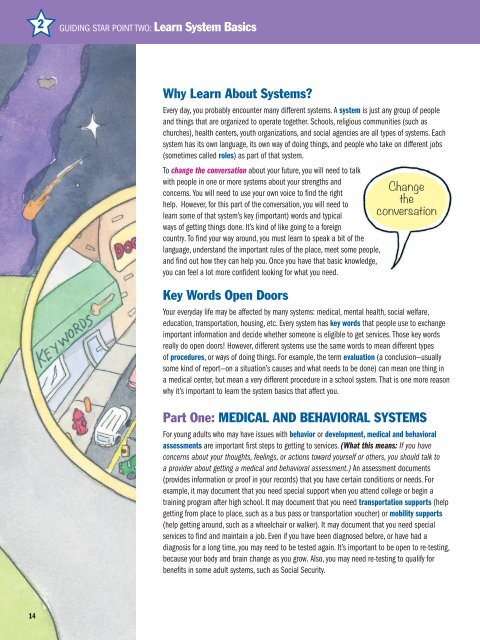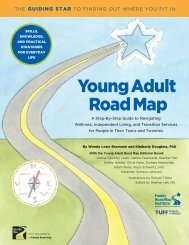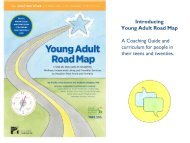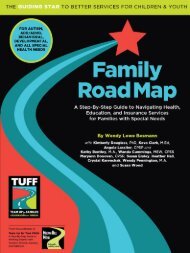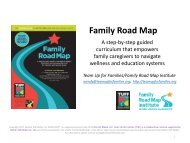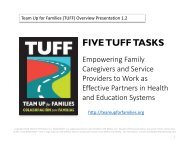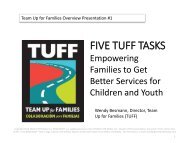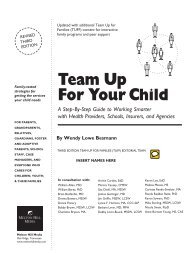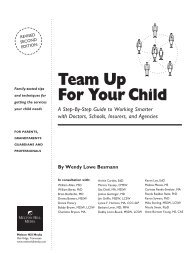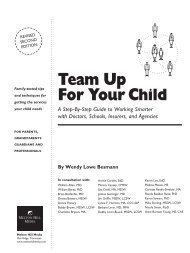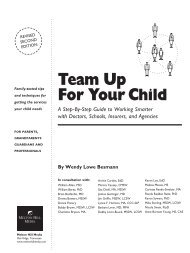Look Inside Young Adult Road Map
Create successful ePaper yourself
Turn your PDF publications into a flip-book with our unique Google optimized e-Paper software.
2<br />
Guiding Star Point Two: Learn System Basics<br />
Why Learn About Systems?<br />
Every day, you probably encounter many different systems. A system is just any group of people<br />
and things that are organized to operate together. Schools, religious communities (such as<br />
churches), health centers, youth organizations, and social agencies are all types of systems. Each<br />
system has its own language, its own way of doing things, and people who take on different jobs<br />
(sometimes called roles) as part of that system.<br />
To change the conversation about your future, you will need to talk<br />
with people in one or more systems about your strengths and<br />
concerns. You will need to use your own voice to find the right<br />
help. However, for this part of the conversation, you will need to<br />
learn some of that system’s key (important) words and typical<br />
ways of getting things done. It’s kind of like going to a foreign<br />
country. To find your way around, you must learn to speak a bit of the<br />
language, understand the important rules of the place, meet some people,<br />
and find out how they can help you. Once you have that basic knowledge,<br />
you can feel a lot more confident looking for what you need.<br />
Key Words Open Doors<br />
Change<br />
the<br />
conversation<br />
Your everyday life may be affected by many systems: medical, mental health, social welfare,<br />
education, transportation, housing, etc. Every system has key words that people use to exchange<br />
important information and decide whether someone is eligible to get services. Those key words<br />
really do open doors! However, different systems use the same words to mean different types<br />
of procedures, or ways of doing things. For example, the term evaluation (a conclusion—usually<br />
some kind of report—on a situation’s causes and what needs to be done) can mean one thing in<br />
a medical center, but mean a very different procedure in a school system. That is one more reason<br />
why it’s important to learn the system basics that affect you.<br />
Part One: Medical and Behavioral Systems<br />
For young adults who may have issues with behavior or development, medical and behavioral<br />
assessments are important first steps to getting to services. (What this means: If you have<br />
concerns about your thoughts, feelings, or actions toward yourself or others, you should talk to<br />
a provider about getting a medical and behavioral assessment.) An assessment documents<br />
(provides information or proof in your records) that you have certain conditions or needs. For<br />
example, it may document that you need special support when you attend college or begin a<br />
training program after high school. It may document that you need transportation supports (help<br />
getting from place to place, such as a bus pass or transportation voucher) or mobility supports<br />
(help getting around, such as a wheelchair or walker). It may document that you need special<br />
services to find and maintain a job. Even if you have been diagnosed before, or have had a<br />
diagnosis for a long time, you may need to be tested again. It’s important to be open to re-testing,<br />
because your body and brain change as you grow. Also, you may need re-testing to qualify for<br />
benefits in some adult systems, such as Social Security.<br />
14


